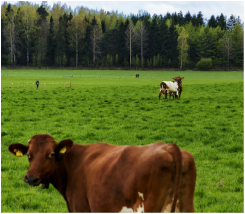 In the Human Diet about one third of our calories should come from protein. Children and young (still growing) adults, as well as adults with special nutritional needs (such as endurance athletes), may require even a little more protein for growth and the formation and restoration of healthy muscles, joints, bones and connective tissues. If you are eating animal-based protein, the thing you most want to consider is this: How healthy was the animal whose proteins you are eating? Pasture raised, organic animals and animal products are healthy sources of protein to which we are well-adapted. However, commercially raised animals are routinely confined in small spaces where they are made to suffer. This causes their bodies to produce high amounts of stress hormones. They are also fed a high carbohydrate diet (corn and grains) to make them big and fat. What’s more, this feed is routinely laced with hormones to make them even bigger and with antibiotics to keep infectious diseases at bay. Such animals are not particularly healthy and their flesh, fat, and milk reflect this. If you eat meat, eggs, or dairy, it is important to choose healthy animals. READ ON: Plant Based Sources of Protein
0 Comments
Red Meat and Cancer: In addition to its role in promoting heart disease, numerous studies have also linked red meat consumption to cancers of various kinds, and especially colon cancer. All mammals except for humans contain on the surfaces of their cells a sugar, called Neu5Gc. When humans eat the meat of cows and pigs, we are consuming Neu5Gc, causing this sugar to stick to the outsides of our cells. Because it is not a sugar that humans are meant to have stuck on our cells, our bodies mount an immune response against the cells with surface Neu5Gc, making antibodies that attack those cells. Daily consumption of red meat causes an ongoing immune response resulting in a state of chronic inflammation. Chronic inflammation is now understood to be the chief driver of heart disease, diabetes, and cancers, among other chronic diseases. Dr. Ajit Varki, at UCSD, has shown that this chronic inflammatory state results in spontaneous cancer tumors in mice genetically engineered to not produce Neu5Gc (like humans) when they are fed meat. There are many reasons to cut down or avoid eating meat, including animal cruelty, pollution effects of cattle, and the various hormones, antibiotics, and grain feeds on which commercial cattle are raised. My recommendation for optimal health is this: if you are going to eat red meat, do so no more than one to three times per month, and buy only organic, pasture raised, animal-centered, grass-fed beef. READ ON: How Healthy Was the Animal Whose Proteins You are Eating? Begin reading from the beginning of this series about Food and Nutrition |
AuthorArchives
August 2021
Categories
All
|


 RSS Feed
RSS Feed